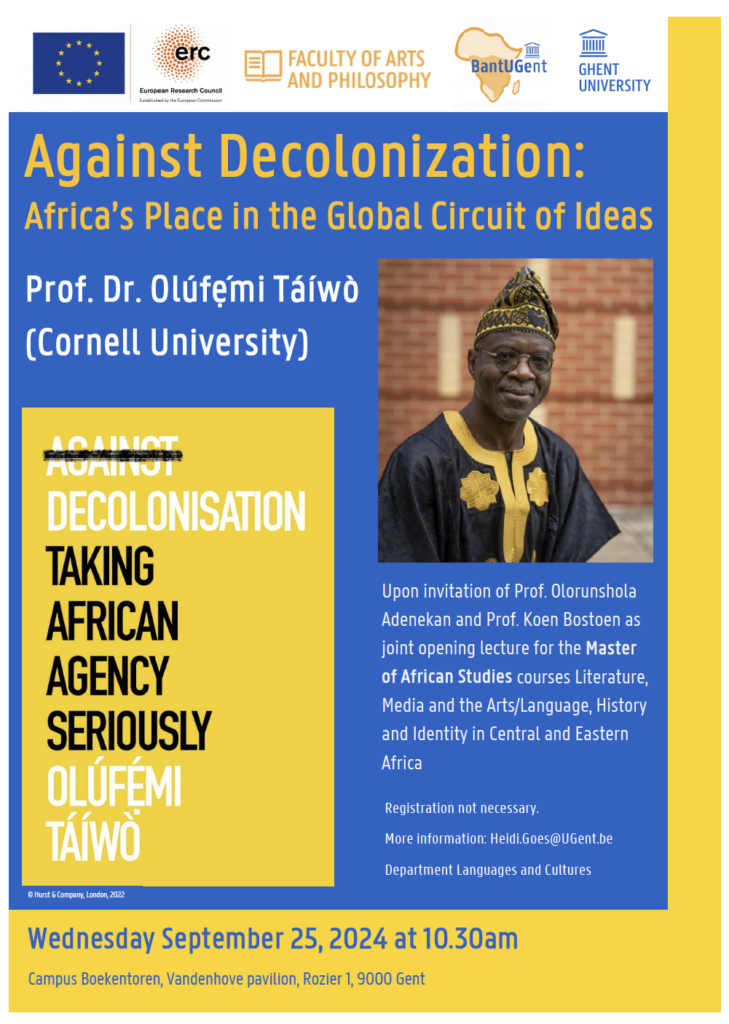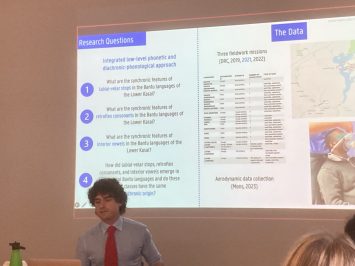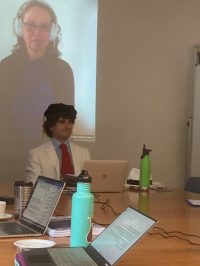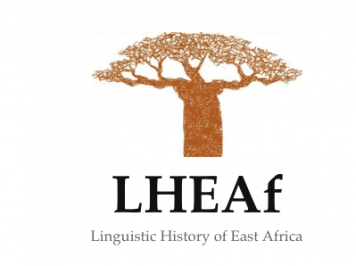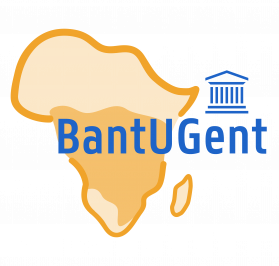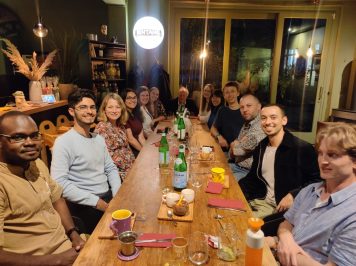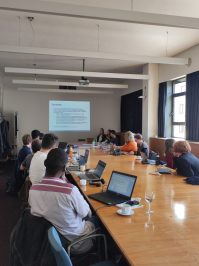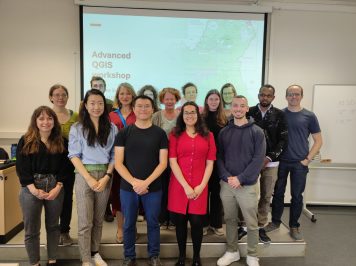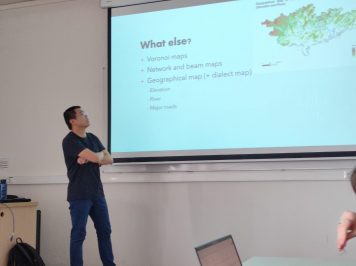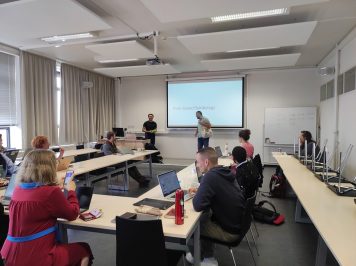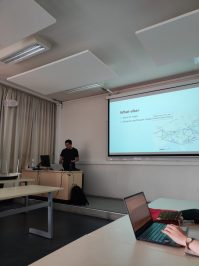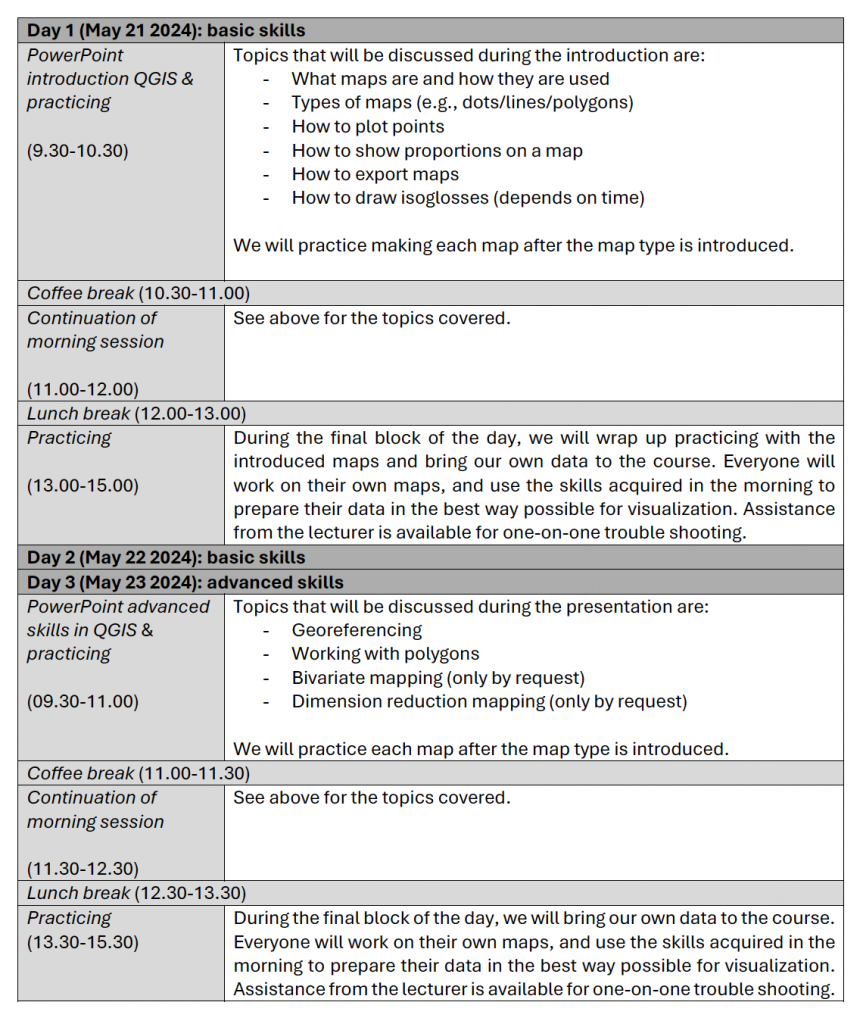What? BantUGent research seminar
When? September 17, 2024
Where? Room 3.30 – Camelot, Blandijn, Campus Boekentoren
15:00-16:00: Ernest Nshemezimana – “The Expression of Mirativity in Kirundi (DJ62)”
16:00-17:00: Sofia Mateus – “Caculo Cabaça, Cuanza Corridor, Angola: a new archaeological landscape for the study of Central African Iron Age”
To join the meeting online by MS Teams, click here.
Archives: Events
Prof. Dr. Olúfẹ́mi Táíwò (Cornell University) “Against Decolonization: Africa’s Place in the Global Circuit of Ideas”
Prof. Dr. Olúfẹ́mi Táíwò (Cornell University) will present the talk titled “Against Decolonization: Africa’s Place in the Global Circuit of Ideas” upon invitation of Prof. Olorunshola Adenekan and Prof. Koen Bostoen. It is the joint opening lecture for their Master of African Studies courses “Literature, Media and the Arts in Central and Eastern Africa” and “Language, History and Identity in Central and Eastern Africa”.
A recording of the lecture and of the Q&A following the lecture can be found below the poster.
Lecture by Prof. Dr. Olúfẹ́mi Táíwò (Teams recording)
Q&A following the lecture by Prof. Dr. Olúfẹ́mi Táíwò
Public PhD defense Lorenzo Maselli
On Friday June 21 at 10am CET, Lorenzo Maselli will publically defended the joint PhD dissertation titled “Documenting the sounds of the West-Coastal Bantu languages of the Lower Kasai region (DR Congo): An integrated phonetic and diachronic-phonological approach” written under the co-supervision of Prof. Dr. Koen Bostoen (BantUGent), Prof. Dr. Sara Pacchiarotti (BantUGent), and Prof. Dr. Véronique Delvaux (UMons). The defense took place in the Faculty Room on the first floor of the Blandijn building (Blandijnberg 2, 9000 Gent) and could also be followed via livestreaming through MS Teams. The jury was presided by Prof. Jo Van Steenbergen and further included Prof. Nancy Kula (ULeiden), Prof. Rachid Ridouane (Université Sorbonne Nouvelle – CNRS, Laboratoire de Phonétique et Phonologie), Dr. Abbie Hangtan-Sonko (CNRS, LLACAN), Prof. Kathy Huet (UMons), Prof. Claudia Crocco (UGent) and Prof. Shola Adenekan (UGent).
ULeiden-BantUGent workshop: Unravelling Africa’s Early Linguistic History
On Friday 17 May, the LHEAf research team from Leiden University will visit Ghent for a joint workshop with BantUGent on the fascinating world of Africa’s early linguistic history. On the program: exploring language contact, diagnosing substrate, and placing linguistic findings in an interdisciplinary context. Be welcome to join the workshop.
Contact: nina.vandervlugt@ugent.be
9am-12pm: Faculty Council Room, Blandijn
Introductions
- 9.15-9.45am
- Introductions BantUGent and LHEAf
- LHEAf project: Unravelling Africa’s Early Linguistic History
Diagnosing Substrate
- 10-10.45am
Substrate Interference in Bantu languages of Central Africa: Insights from Diachronic Phonology — Sara Pacchiarotti - 11am-12pm
Substrate Interference in Eastern Africa — Dominique Loviscach, Alba Hermida Rodriguez, Maarten Mous
12-1.30pm: Lunch break
1.30-5pm: Room 3.1, Tweekerken, Campus Tweekerken
Language contact
- 1.30-2.15pm
(Pre)historic Bantu-Khoisan interactions in Southern Africa in a historical linguistic perspective — Hilde Gunnink
- 2.30-3.15pm
The Bantu Expansion in Eastern Africa — Maarten Mous
Interdisciplinary research
- 3.30-4.15pm
Bantu Language divergence and convergence and deep-time population history in the Lower Kasai area (DR Congo) — Koen Bostoen - 4.15-5pm:
From linguistic to interdisciplinary research in Eastern Africa
BantUGent research seminar with talks by Megersa Regassa and Brandon Kieffer
What? BantUGent research seminar
When? April 29, 2024
Where? Room 2.23 – Panopticon, Blandijn, Campus Boekentoren
15:00-16:00: Megersa Regassa: “Monsters in Oromo Oral Narratives from a Gendered Perspective”
16:00-17:00: Brandon Kieffer, “Bantu Spirantization in Great Lakes Bantu”
To join the meeting online by MS Teams, click here.
Map making for linguists in QGIS – Doctoral Schools Training BantUGent
Maps are an important visualization tool for linguists. However, most linguists are not trained in and thus not able to design professional maps. QGIS is opensource mapping software that enables its users to plot features, create data points, or redraw existing maps. For researchers that work with little known languages, software like QGIS is vital in providing reliable maps when there are often none available.
To this end, Matthew Sung (affiliated with the Leiden University Centre of Linguistics and the Leiden University Centre for Digital Humanities) taught several QGIS workshops at the Faculty of Arts and Philosophy from 21 May – 23 May 2024. Participants will also apply the software to their own data. The introduction session was run twice on 21 May and 22 May. Each session could have up to 20 participants. The advanced session was run once on 23 May and had availability for 15 people. Registration closed on 15 April 2024.
As this event was financed by the Doctoral School of UGent and the Flemish Government, doctoral students were given priority during registration. If PhD students participated in the introduction session, it counted as a transferable skill course. If PhD students participated in both the introduction and advanced session, it counted as a specialist course. Evaluation for PhD students were based on attendance and active participation.
The organizer was Nina van der Vlugt (nina.vandervlugt@ugent.be). See below for the program.
BantUGent seminar with talk by Simon Nsielanga Tukumu (KULeuven) on the Decolonization of Jesuits in Congo
What? BantUGent research seminar
When? March 8, 2024
Where? Faculteitsraadzaal/Facultyroom
11:00-13:00: Simon Nsielanga Tukumu: The Decolonization of the Society of Jesus in the Belgian Congo in the post-World War II: Reasons behind the opening of the Jesuit Novitiate in Djuma
To join the meeting online by MS Teams, click here.
BantUGent seminar with talk by Pieter De Coene (UGent) on lexicalizing spirit possession in Great Lakes Bantu
What? BantUGent research seminar
When? March 25, 2024
Where? vergaderzaal Simon Steven, Jozef Plateaustraat 22, 9000 Gent
15.00-16.00: Pieter De Coene: Lexicalizing spirit possession: attestations of –bandw– and related terms in Great Lakes Bantu (part one)
To join the meeting online by MS Teams, click here.
BantUGent research seminar with talks by Terefe Mitiku Mekonin and Edward Ntonda
14:00-15:00: Edward Ntonda: “Chikunda in Time and Space : A Historical Sociolinguistic account”
15:00-16:00: Terefe Mitiku Mekonin “Human and animal interaction in Oromo fable”
For the Teams-link, contact: Lorenzo Maselli (lorenzo.maselli@ugent.be)
BantUGent research seminar: Nina van der Vlugt presents herself and her FWO-funded research project.
More info: Lorenzo.Maselli@UGent.be
